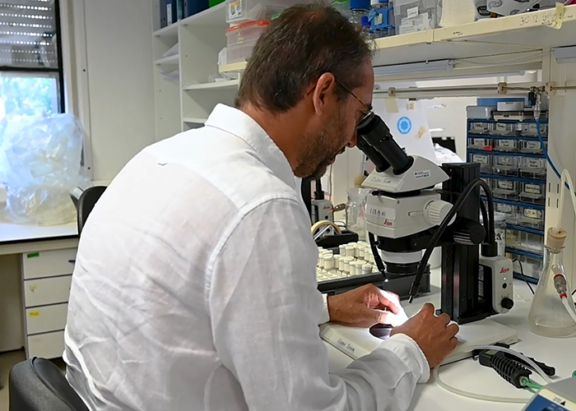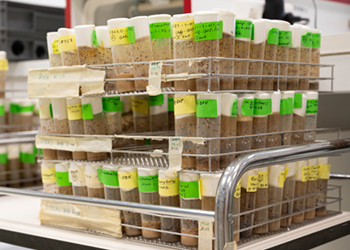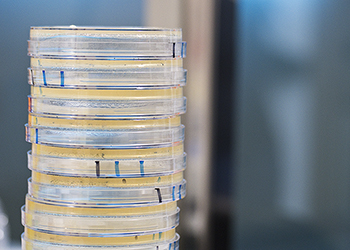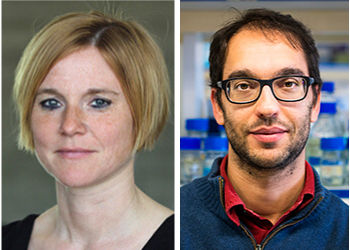
Host-Microorganism Interactions
Luís Teixeira
Multicellular organisms and microorganisms are continuously interacting. Many of these interactions are mutually beneficial. However, multicellular organisms have to actively thwart invasion by opportunistic or overtly pathogenic microbes.
Host-microorganisms interactions research group is studying the interaction of the model organism Drosophila melanogaster with different microorganisms, in particular intracellular ones. D. melanogaster has been successfully used as a model system to study innate immunity against many pathogens.
Recently it has been shown that there are innate immunity pathways against viruses conserved between insects and mammals. The research group is investigating mechanisms of resistance to viruses in the fruit fly.
Interestingly, they have found that the intracellular bacteria Wolbachia confer resistance to RNA viruses in D. melanogaster. They want to understand the molecular basis of this induced resistance.
Finally, they are interested in the interplay between Drosophila and Wolbachia itself. These endosymbionts are one of the most widespread intracellular bacteria in the world but little is known, at the molecular level, on how the hosts control Wolbachia or Wolbachia manipulate the hosts.
Funding Member


Projects
SymbNET is a European network for research on host-microbe symbiosis, funded by the European Union’s Horizon 2020 research and innovation programme. Animals and plants live with microbial communities that have a strong impact on their development, physiology, and evolution. Thus, understanding these symbiotic interactions is a crucial axis of research in Fundamental Biology and Health Sciences. This field requires multidisciplinary, highly skilled teams and collaborative research.
SymbNET will create a European network in the use of Genomics and Metabolomics in Host-Microbe Symbiosis research. It will bring together a consortium of leaders in the field that present a wide range of expertise, technological knowledge, scientific questions and approaches in Host-Microbe Symbiosis. SymbNET will promote the transfer of knowledge and collaborations through programs of Researchers and Staff visit exchanges, collaborative projects, sponsoring the use of new technologies, organizing scientific meetings, workshops, PhD Summer Schools, and a European meeting on Host-Microbe Symbiosis. There will be specific actions targeted at Early Stage Researchers to promote their research, training, mentoring, and networking, ensuring gender equality in participation.
SymbNET will establish a European consortium in Host-Microbe Symbiosis, capacitate the participating institutions, and promote this crucial growing area of research at the local and international level.

Publications
- Duarte EH, Carvalho A, López-Madrigal S, Costa J, Teixeira L (2021) Forward genetics in Wolbachia: Regulation of Wolbachia proliferation by the amplification and deletion of an addictive genomic island.. PLoS Genetics 17(6):e1009612.
- Faria, V. G., Martins, N. E., Magalhães, S., Paulo, T. F., Nolte, V., Schlötterer, C., Sucena, E., Teixeira, L. (2016) Drosophila Adaptation to Viral Infection through Defensive Symbiont Evolution. PLoS Genetics 12(9):e1006297
- Gutzwiller, F., Carmo, C. R., Miller, D. E., Rice, D. W., Newton, I. L. G., Hawley, R. S., Teixeira, L., Bergman, C.M. (2015) Dynamics of Wolbachia pipientis Gene Expression Across the Drosophila melanogaster Life Cycle. G3; Genes|Genomes|Genetics 5(12):2843–2856
- Chrostek, E., Teixeira, L. (2015) Mutualism Breakdown by Amplification of Wolbachia Genes. PLoS Biology 13(2):e1002065
- Chrostek, E., Marialva, M. S. P., Yamada, R., O'Neill, S. L., Teixeira, L. (2014) High Anti-Viral Protection without Immune Upregulation after Interspecies Wolbachia Transfer. PLoS ONE 9(6):e99025
- Martins, N. E., Faria, V. G., Nolte, V., Schlotterer, C., Teixeira, L., Magalhães, S., Sucena, É. (2014) Host adaptation to viruses relies on few genes with different cross-resistance properties. PNAS 111(16):5938–5943
- Martinez, J., Longdon, B., Bauer, S., Chan, Y.-S., Miller, W.J., Bourtziz, K., Teixeira, L., Jiggins, F.M. (2014) Symbionts commonly provide broad spectrum resistance to viruses in insects: a comparative analysis of Wolbachia strains. PLoS Pathog 10(9):e1004369
- Ferreira, A.G, Naylor, H., Esteves, S.E., Pais, I.S., Martins, N.E., Teixeira, L. (2014) The Toll-Dorsal pathway is required for resistance to viral oral infection in Drosophila. PLoS Pathog 10(12):e1004507
- Martins, N. E., Faria, V. G., Teixeira, L., Magalhães, S., Sucena, É. (2013) Host Adaptation Is Contingent upon the Infection Route Taken by Pathogens. PLoS Pathogens 9(9):e1003601
- Chrostek, E., Marialva, M. S. P., Esteves, S. S., Weinert, L. A., Martinez, J., Jiggins, F. M., Teixeira, L. (2013) Wolbachia Variants Induce Differential Protection to Viruses in Drosophila melanogaster: A Phenotypic and Phylogenomic Analysis. PLoS Genetics 9(12):e1003896
- Teixeira, L., Ferreira, A., Ashburner, M. (2008) The Bacterial Symbiont Wolbachia Induces Resistance to RNA Viral Infections in Drosophila melanogaster. Plos Biol 6(12):e2



